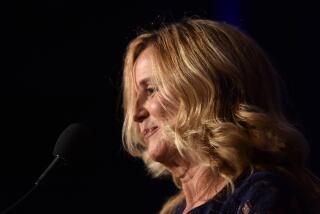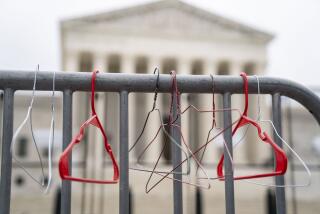In the Washington swamp, careerism vies with chaos
The two stories that dominated Washington this week — the anonymous official who wrote an opinion column attacking Trump, and the Supreme Court confirmation hearings for Brett Kavanaugh — share a common thread: careerism.
The word is seldom used as a compliment. Perhaps that’s wrong.
The traits of the careerist — concern for personal advancement, avoidance of controversy, willingness to sacrifice ideals for the sake of long-term goals — have long been equated with moral cowardice. But as the week’s news suggested, the flip side that accompanies each of those traits — diligence, professionalism, ability to compromise when needed — can also form a bulwark against chaos.
Sign up for the Essential Politics newsletter »
A HINT OR A FAKE?
Through two long days of questioning which began early in the morning and stretched late into the night, Democratic members of the Senate Judiciary Committee voiced two overriding concerns about Kavanaugh.
One, undoubtedly grounded in evidence, focused on ideology. Kavanaugh, following the advice he once gave another judicial nominee two decades ago, strove to present himself as near as possible to a blank slate, but his record makes clear that he has strongly held views about the law.
As Jennifer Haberkorn, David Savage and Sarah Wire wrote, Kavanaugh has a broad view of the gun-owner rights protected by the 2nd Amendment, a narrow view of the powers of federal regulatory agencies and skepticism about claims for rights not specifically mentioned in the text of the Constitution.
Pressed, sometimes intensely, on those positions, the nominee invariably offered politely deferential, affable answers in which he thanked Democratic senators for offering their “perspective,” pledged to keep an open mind, but gave no hint at retreat.
The one exception came on the Supreme Court’s most divisive issue — abortion. President Trump said in his campaign that he would appoint judges who would overturn Roe vs. Wade, the 1973 decision that established abortion rights nationwide.
Kavanaugh repeatedly refused to say how he would rule on the issue. But he offered hints that overturning Roe may not be in the offing.
The strongest suggestion came as part of an analogy. Kavanaugh noted that the late Chief Justice William H. Rehnquist, whom he has cited as one of his judicial heroes, had long criticized the Supreme Court’s Miranda ruling, which requires police to read suspects their rights before questioning. But when Congress passed a law to overturn Miranda, Rehnquist wrote the 7-2 decision in 2000 that kept the warnings in place.
Rehnquist “decided that it had been settled too long, had been precedent too long, and he reaffirmed it,” Kavanaugh told Sen. Dianne Feinstein, volunteering the history of Miranda in response to her question about Roe.
Was all that an elaborate head fake? Perhaps. As Democrats noted, a hint isn’t a commitment, and a precedent is only good so long as a majority of the high court stands by it. Moreover, as abortion-rights supporters also said, a conservative Supreme Court could significantly restrict the right without actually overturning Roe.
Still, the goal of the antiabortion movement for 45 years has been to overturn Roe, not just to narrow it. Sixteen years ago, three Republican Supreme Court appointees — Justices Anthony M. Kennedy, Sandra Day O’Connor and David Souter — bitterly disappointed that movement when they joined with Democrat appointees to reaffirm Roe in the case of Planned Parenthood vs. Casey. Kavanaugh’s hint suggests that might happen again.
TRIUMPH OF THE ANTI-TRUMP
The other main Democratic objection to Kavanaugh involved the man who appointed him.
As a lawyer and a judge, the Democrats noted, Kavanaugh has expressed a broad view of presidential power, including the chief executive’s authority to fire other executive branch officials.
Trump, they suggested, picked Kavanaugh expecting that as a Supreme Court justice, he would side with the president in any future battle with Robert Mueller, the special counsel.
Sen. Sheldon Whitehouse of Rhode Island, one of the nominee’s fiercest critics, called him a “human torpedo” aimed at Mueller’s investigation of Russian efforts to sway the 2016 election.
All that’s possible. Kavanaugh’s previous writings definitely suggest strong support for legal theories that favor executive power.
Under questioning, Kavanaugh refused to tip his hand. He largely stuck to his views on presidential authority. And he avoided even a hint of criticism of Trump, as when Sen. Jeff Flake of Arizona asked him to comment on Trump’s tweets that attacked Atty. Gen. Jeff Sessions for not shielding Republican members of Congress from prosecution.
As a judge, Kavanaugh said, he needed to stay “three ZIP Codes away” from any comment on politics.
But he also repeatedly praised U.S. vs. Nixon, the case in which the Supreme Court ordered release of the White House tapes in the Watergate scandal, leading directly to Nixon’s resignation 16 days later.
And the visual tableau of the hearings suggested an alternative possibility.
Sitting behind the nominee, hour after hour, was the main White House champion of Kavanaugh’s nomination, Donald McGahn, the White House counsel. Just last week, Trump effectively fired McGahn with a tweet, as Eli Stokols and Noah Bierman wrote.
The president announced McGahn would leave his job “shortly after the confirmation.” He dismissed McGahn after news broke that the White House lawyer had spent more than 30 hours testifying to Mueller’s prosecutors.
The nominee will almost surely be confirmed later this month. His prospects got a boost just as his hearing began, when Arizona Gov. Douglas Ducey named former Sen. Jon Kyl to fill the Senate seat left vacant by the death of Sen. John McCain, whose funeral Saturday had a persistent subtext of countering Trump.
As Mark Barabak noted, Kyl had already been working to help shepherd Kavanaugh’s nomination.
With his nomination on a fast track toward confirmation, it’s worth pondering where Kavanaugh’s sympathies truly would lie in a possible Trump-Mueller battle.
Kavanaugh is in many ways the anti-Trump — concerned for precedent and orderly procedures, a strong advocate for racial equality in his profession, an embodiment of the Republican elite that Trump has attacked and deeply mistrusts.
In short, if one searched for an older figure that Kavanaugh’s career reflects, a good model would not be Trump. It would be Mueller. How that might play out, time will tell.
‘GUTLESS’ OR HERO?
The other person in the news whom Kavanaugh seemed to resemble — at least in sensibility and career arc — would be the so-far anonymous official whose op-ed article in the New York Times this week about internal administration resistance to Trump threw the president into a fury.
As Noah Bierman wrote, Trump denounced the official as “gutless” and suggested he was guilty of “treason.”
While official Washington engaged in endless rounds of speculation over the official’s identity, and senior Trump aides lined up to deny culpability, Trump veered between ordering investigations to find the miscreant and insisting it was all made up. He had a very similar reaction earlier in the week to revelations in a new book by Bob Woodward, as Stokols wrote.
Like Kavanaugh, the anonymous official appears to have risen carefully through the ranks of the pre-Trump Republican Party. The writer praised the party’s principles of “free minds, free markets and free people” and declared allegiance not to the “deep state” of Trump’s fears, but to “the work of the steady state.”
As Bierman and Stokols wrote, that path of internal resistance carries its own risk. Trump, feeling increasingly isolated and talking openly about being “amazingly alone,” has responded by moving closer to people who praise him — like North Korean dictator Kim Jong Un.
As Trump moves down his own increasingly isolated path, might Kavanaugh one day find himself aligned with those senior officials who, as the op-ed writer described them, are “working diligently from within to frustrate parts of [Trump’s] ... agenda and his worst inclinations”?
THE FORTUNATE SON
Barring a huge upset, Gavin Newsom will become California’s next governor after November’s election, marking the first time one Democrat has handed the governorship of the state to another Democrat since 1888.
As Seema Mehta, Ryan Menezes and Maloy Moore documented, Newsom’s rise has benefited enormously from the support of a small handful of San Francisco’s wealthiest, most socially prominent families.
Their work provides a fascinating illustration of the enduring influence of the state’s long-standing elite, even in the midst of rapid social and demographic change.
THE MIDTERMS HURTLE INTO THE FINAL STRETCH
Newsom’s election is easy to predict. Much else about the midterm election remains uncertain. The prime reason, as Barabak wrote, is that the election features two opposing forces: a booming economy pitted against one of history’s most unpopular presidents.
One measure of Trump’s problem: This summer, the USC-Dornsife/Los Angeles Times poll asked people to rate how much they trusted several potential sources of news. Only about 1 in 5 voters said they mostly or completely trusted what Trump says, the poll found.
President Obama remains considerably more popular than Trump. The former president is heading to Southern California this weekend to campaign for Democrats in key House races. As Christine Mai-Duc reported, the visit will kick off a round of campaign appearances Obama is making as he steps up his political activity in this campaign’s final stretch.
How are those key California races shaping up? Here’s a rundown on information for each of the contests.
One race has gotten more competitive because of scandal. Rep. Duncan Hunter (R-Alpine) was indicted last week on charges of using campaign money for personal expenses. Prosecutors noted this week that those expenditures include hotel rooms and vacations with a number of unnamed individuals. Hunter’s lawyer accused prosecutors of using evidence of extramarital affairs to harm his reputation and drive a wedge between him and his wife, who is also his co-defendant.
OBAMACARE IN THE COURTS
Democrats have reaped political benefit by accusing Republicans of trying to repeal Obamacare’s popular protections for people with preexisting medical conditions.
Republicans have helped the Democrats highlight that issue by backing a court case that would knock the preexisting conditions protections out of the law. As Noam Levey wrote, a federal judge in Texas heard arguments in the case this week and promised a quick decision, which could come before the election.
CAN GREENHOUSE GASES BE DIVERTED FOR GOOD?
Greenhouse gases are warming Earth’s climate in risky ways. Even as efforts continue to reduce emissions, some scientists, engineers and entrepreneurs are investigating how to take carbon out of the atmosphere and divert it in ways that would combat warming. Evan Halper looks at an innovative but controversial technology.
LOGISTICS
That wraps up this week. Until next time, keep track of all the developments in national politics and the Trump administration with our Essential Washington blog, at our Politics page and on Twitter @latimespolitics.
Send your comments, suggestions and news tips to politics@latimes.com.
If you like this newsletter, tell your friends to sign up.
More to Read
Get the L.A. Times Politics newsletter
Deeply reported insights into legislation, politics and policy from Sacramento, Washington and beyond. In your inbox three times per week.
You may occasionally receive promotional content from the Los Angeles Times.







